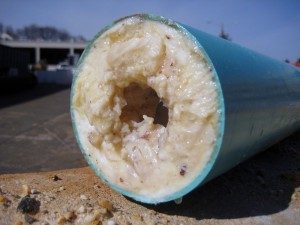Why are we calling attention to this program?
The improper disposal of fats, oil, and greases (FOG) by residents and businesses is increasing. The Galveston Bay Foundation wants to encourage residents to take action and stop pouring FOG down the kitchen sink with the purpose of reducing sanitary sewer overflows (SSOs). SSOs from buildups of fats, oils, and greases in our pipes result in harmful bacteria being introduced into the waters of Galveston Bay. Aging infrastructure, combined with improper disposal of FOG in single and multi-family homes, can also lead to costly problems for both local governments and citizens in terms of sewer lines, home plumbing repairs, and environmental remediation.
What’s the difference between oil and grease?
The terms are often used interchangeably, but they are very different substances.
- Grease is the solid white residue left over in the cooled pan after frying meat products
- Oil is the liquid left over from frying foods and never permanently solidifies
What are the common mistakes people make when disposing of FOG?
When many people are finished cooking, they tend to dump left-over cooking grease, oils, and leftover food scraps down the sink and simply turn on the garbage disposal. Another common mistake is rinsing dishes in the sink with hot water to remove the grease residue left on plates.
What can happen if I dispose of FOG down my kitchen sink?
 Grease makes its way into city sanitary sewer pipes when things like oil, butter, shortening, food scraps, and even some sauces are washed down the sink drain. Improper disposal of fats, oil, and greases can result in blockages in city sanitary sewer lines and home pipes. This can lead to extensive property damage and foul odors due to back up pipes. These pipe blockages can also cause sewer overflows, which spill raw sewage and introduce harmful bacteria into our water resources, parks, playgrounds, streets, and homes.
Grease makes its way into city sanitary sewer pipes when things like oil, butter, shortening, food scraps, and even some sauces are washed down the sink drain. Improper disposal of fats, oil, and greases can result in blockages in city sanitary sewer lines and home pipes. This can lead to extensive property damage and foul odors due to back up pipes. These pipe blockages can also cause sewer overflows, which spill raw sewage and introduce harmful bacteria into our water resources, parks, playgrounds, streets, and homes.
What can I do to help the problem?
- Avoid pouring FOG and food scraps down the kitchen sink
- Before putting your dirty dishes in the sink, wipe off excess grease with a paper towel and throw the paper towel in the trash
- Pour grease into a sealable container, freeze, and dispose in the trash when the container is full
- If there is a recycling center near you, take your filled grease container in so it can be made into biodiesel fuel
- Take the pledge to Cease the Grease in your household!


